'I don’t think a player bought a drink for the next six months after that!': Dewsbury legends share memories of 1973 Championship victory
and live on Freeview channel 276
Young, local heroes, as they were at the time. They remember it vividly. Not just the grand final against Leeds in which, incredibly, against all odds, they won 22-13, to secure the first - and only - rugby league Championship triumph for the club. But the run to the showpiece occasion in which they beat Oldham, Featherstone and Warrington; every special move Tommy Smales imagined from scratch to give them a creative edge in a division which contained a mere 29 other teams during a gruelling campaign; the unmistakable heartache of defeats in the Challenge Cup semi-final, as well as the final of the prestigious Yorkshire Cup; the adoring looks on the thousands of faces - and cacophony of noise generated - upon their heroic welcome return to the town on that special day, May 19.
Treasured memories which will never be erased. One of the sport’s true underdog stories.
Advertisement
Hide AdAdvertisement
Hide Ad“There aren’t a few minutes where I don’t think about it,” admits Tommy. He is reminded about it every single day by a photo of his team which hangs, preciously, at the bottom of his stairs at his West Yorkshire home.
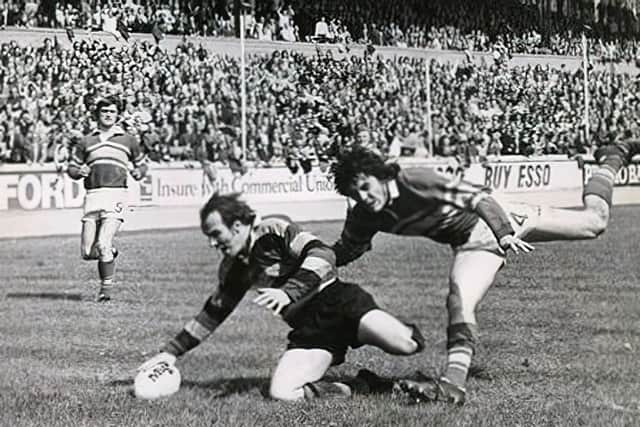

“It is there every time I go up and come down the stairs. I look at that and it reminds me. Not that I need that much reminding but it brings back the thoughts.”
“The memory will always linger on,” confirms Stevo, who, only a year before had scored the match-winning try as Great Britain beat Australia to clinch the World Cup. He was a double-try scoring hero at Odsal. The man of the match. “It is something that we will cherish forever more.”
“I can remember it like yesterday,” says his namesake, Nigel, no relation. The centre, born in Batley Carr, was only 22 at the time. He went on to win two more Championship titles with Bradford Northern, but, in his own words, “the one with Dewsbury means more to me because most of us were all local, Dewsbury lads.”
Advertisement
Hide AdAdvertisement
Hide AdJohn Bates, along with his brother Alan, were just that. Dewsbury born and bred. Slightly older at the age of 30, with Alan 15 months his junior, John was one of the most experienced players in the squad and both would go on to represent their country.
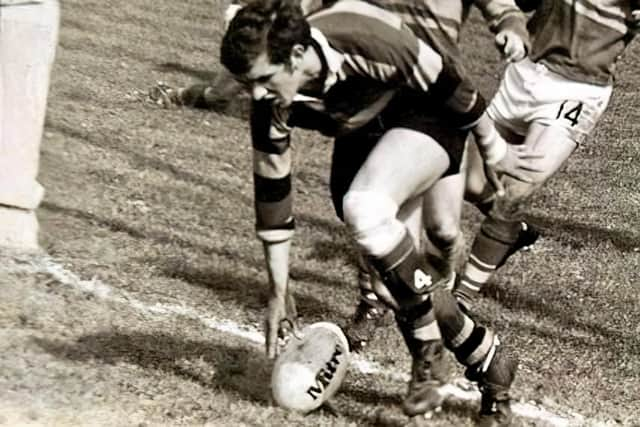

“My Father watched Dewsbury, my Grandfather watched Dewsbury,” John says. “It was brilliant to play for them.”
This eagerness and enthusiasm was a key trait of Tommy’s team, which enabled them to finish in eighth position in the league and compete in the top-16 play-off system - the last of its kind until the 1998 Super League season, as the Championship was then split into two divisions from 1974.
“These players gave me everything,” the former head coach says. “We had a good side and we had some good players but we could have done with one or two extra.
Advertisement
Hide AdAdvertisement
Hide Ad“We finished eighth, which was a good position. We weren’t a top club. We were a little bit behind and we probably needed a couple of extra players to strengthen the squad.
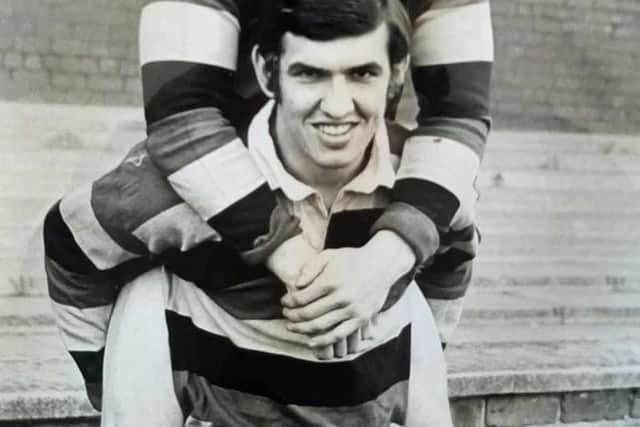

“But they gave me 100 per cent. I mean that. We had a good team spirit. I talked to every player and told them, “You’re all club people, we’re all one.”
“I got to know what their past times were, who they lived with. I was probably a little bit nosey sometimes but you get to know these people and then you create a bond between them and you.
“That’s how we won our matches but we were also 100 per cent fit. They trained very hard.”
Advertisement
Hide AdAdvertisement
Hide AdCrown Flatt played host to just one play-off match, a 29-14 victory over Oldham, with Nigel - the club’s all-time record holder for goal scoring and points - helping himself to a couple of tries.
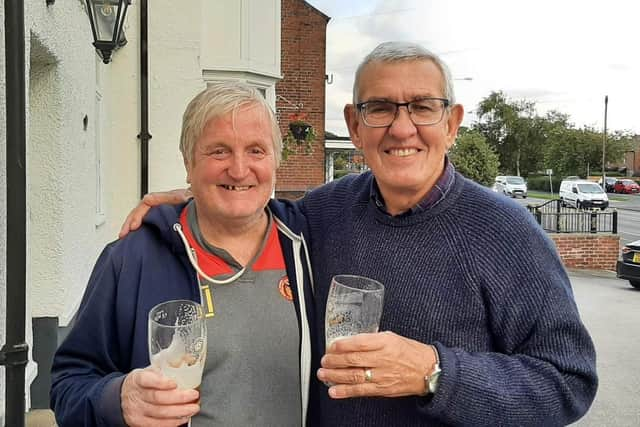

And then came the trip to second placed Featherstone Rovers in the quarter finals. A great side, led by Peter Fox, who would go on to beat Bradford Northern in the Challenge Cup Final at Wembley.
They also got their hands on the 1967 edition of the famous trophy, with a certain Tommy Smales making a significant contribution - courtesy of a try, two goals and a penalty - in a 17-12 victory over his former side Barrow.
“Peter put Steve Nash and Keith Bridges on the bench because he thought they were going to beat us comfortably,” Nigel recalls. “We scored 16 points in about 20 minutes, I scored tries again, Stevo got a couple.
Advertisement
Hide AdAdvertisement
Hide Ad“Peter brought them two on from the subs bench, Stevo scored another try so he took them back off!
“Later in life, I worked with Peter at Bradford and I said to him, “What did you do that for?” He said, “I had a soft spot for Dewsbury, I wanted them to win!” He was lying, but that’s what he said!”
Bradford’s journey to the final of the Challenge Cup presented a semi-final clash with Dewsbury at Headingley. And while Tommy’s men may have been underdogs on their way to Championship glory, they were overwhelming favourites to beat a Northern side who ended the league season languishing in 23rd place.
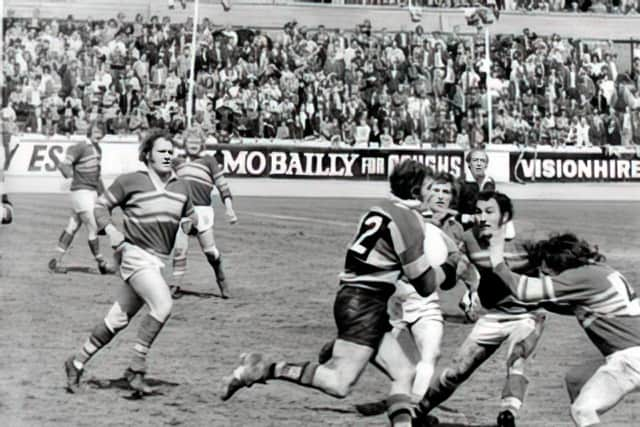

“They didn’t have a great team,” reveals Stevo, now 76. “We were red-hot favourites and they roughed us up. We did not fire. We were so disappointed. Maybe we were overconfident, I’m not sure.”
Advertisement
Hide AdAdvertisement
Hide AdThis wasn’t the first cup disappointment of the season, as Leeds had earlier thrashed Dewsbury 36-9 in the final of the Yorkshire Cup at Odsal.
Feeding on those past regrets, Dewsbury had to overcome highly-fancied Warrington if they were to face Leeds again in another showpiece occasion at one of the sport’s most iconic venues.
Nigel says: “The semi final was unbelievable, at Alex Murphy’s Warrington. That was the toughest game we ever played. We won that 12-7 and I remember scoring in that game, Alan Bates put me over the tryline.”
Thus, the date was set. Saturday, May 19, 1973. Reigning champions Leeds against unfancied longshots Dewsbury.
Advertisement
Hide AdAdvertisement
Hide Ad“Leeds were favourites by a long way,” Nigel confirms. “Their coach, on the morning of the game, said, “I don’t know why Dewsbury are bothering to turn up.”
“They had 13 internationals playing. We were a local team. But we turned up and we did them! We had Stevo, a great captain, Tommy Smales, a great coach, we had a great team spirit and everyone knew their job and knew what they were good at.”
Hooker Stevo says: “We assessed ourselves after Bradford and beat Featherstone and Warrington away. It was a complete turnaround.
“We were underdogs, it was 13 internationals against one, but it suited us and we knew that we could do it. We threw everything at Leeds after getting hammered in the Yorkshire Cup final.”
Advertisement
Hide AdAdvertisement
Hide AdTommy adds: “It was a marvellous day. They were all international players and we raised our game to the highest point we could do and it was higher than what Leeds reached.”
Tries from Stevo and Allan Agar, and two goals and a drop-goal from Nigel, gave Dewsbury an astonishing 12-4 half-time lead. They were also assisted by Alan Hardisty’s dismissal after a high shot on John.
“That went our way,” says the former forward. “I got it and he stretched his arm out and hit me straight across the face. Mick Stephenson was the first man on the scene, before the referee or anybody, and he said, “Stay down John, shut your eyes, he’s going to send him off!”
“I was dazed and I didn’t know where I was, but I remember hearing that!
Advertisement
Hide AdAdvertisement
Hide Ad“I then went on tour with Great Britain the following year in Australia and who should I meet up with at Rockhampton - Alan Hardisty who was coaching there! And he said, “Don’t let him in here, he’s the only man who’s ever got me sent off!”
“We had a big laugh about it.”
Stevo grabbed another in the second half. The talented Nigel dived over as well. 22-13. This was not supposed to happen.
But it did. The dream became a reality. And while Stevo, who received the Harry Sunderland Trophy for his virtuoso display, is widely associated with this historic success, he and his former team-mates point to the special moves created by their head coach as a decisive factor.
“We had so many moves under Tommy Smales, like this is ridiculous,” says Stevo. “Tommy was adamant. He said we will throw all these silly moves and put them into play in the opening 10, 15 minutes and it stung Leeds.
Advertisement
Hide AdAdvertisement
Hide Ad“They went into the game thinking they were pretty sure they could run away with it. Our team spirit and defence were key factors. We defended like our lives depended on it. It was a team effort.
He insists: “I know that I scored two tries and I got the Harry Sunderland award, but it was nothing to do with me at all. It was the team spirit and the team itself that got there. It was about defence, defence,defence.
“We opened up with everything we had, we put the moves on and we threw everything at them both in defence and in attack. We upset the odds.”
“We did running-arounds, drop-offs,” Nigel says. “Stevo was always the man who called the move, John Bates was usually the runner and I supported him and got on the end of it and we ended up scoring.
Advertisement
Hide AdAdvertisement
Hide Ad“Most players knew their roles in the moves but Alan Bates, Tommy didn’t use to involve him if he could help it. Because Alan Bates did exactly what he wanted to do!
“If he wanted to run it, he’d run it. If he wanted to kick it, he’d kick it. And if he wanted to smack somebody in the mouth, he’d smack somebody in the mouth! He was the toughest scrum half I have ever played with in my life.”
On designing his special moves, Tommy recalls:
“I sat in my lounge, got a piece of paper and drew and thought about how this team could be better than other teams. I worked out parts of play where we could breach their defence and we got four, five moves on and, eventually, the players got them off to a tee and everybody was saying, “How do you do that?”
“It was about patience and players who wanted to do it. I talked with the players, we ironed one or two things out, and we were the envy of the league. Nobody else could copy them.
Advertisement
Hide AdAdvertisement
Hide Ad“I had seen little drawings in the newspapers where reporters tried to say, “Tommy had this move”, and they’d put crosses and noughts on a bit of paper and put it in the newspaper but it was nowhere near what we did!
“Some were very intricate and took a lot of working out and the players gave their input as well. They worked to perfection because everyone wanted to do it.
“We breached the defence and breached the defence and no other team in the league knew how to combat it because in those days there was no television, so nobody could copy the moves.”
A true team effort of players buying into the coach’s system. And what a reward.
Advertisement
Hide AdAdvertisement
Hide AdBut no-one could have imagined what was to happen next as the local heroes made their triumphant journey back home to Dewsbury.
Stevo reminisces: “It was amazing. The Dewsbury fans came onto the field after the final whistle went. It was an extraordinary feeling.
“And when we came back on the bus they said we’ll be celebrating at the Town Hall up on the balcony. We didn’t expect many fans to be there.
“There were thousands. It was amazing. It is one of the highlights of my career. It is up there just on the same level as when I was lucky to play for Great Britain when we won the World Cup in 1972.”
Advertisement
Hide AdAdvertisement
Hide AdIt was Stevo’s last involvement with the club before his move to Australia, where he signed for Penrith.
Nigel confirms: “We came home to a civic reception at Dewsbury Town Hall and we came back over on a bus and we thought there'd be nobody there.
“We turned around the corner by Woolworths and there must have been 10,000 people around the Town Hall. It was unbelievable. We had never seen anything like that.
“We were up on the balcony and they were cheering and chanting your name. “Nigel, Nigel”, they were chanting. My confidence was sky high that season but I will never forget that. It was magnificent.
Advertisement
Hide AdAdvertisement
Hide Ad“I don’t think a player bought a drink for the next six months after that!”
“There were thousands there,” John adds. “We were really chuffed that people had taken an interest and came to see us home.”
Tommy concludes: “Wembley was a fine one with Featherstone against Barrow. That was heaven. I had a point and I proved it with a try and three goals.
“But Dewsbury stands out the most.”
50 years later, the surviving stars of that extraordinary team will be reuniting at the Rams to reminisce on their 1973 heroics.
And listen up, because they have got a fascinating story to tell.